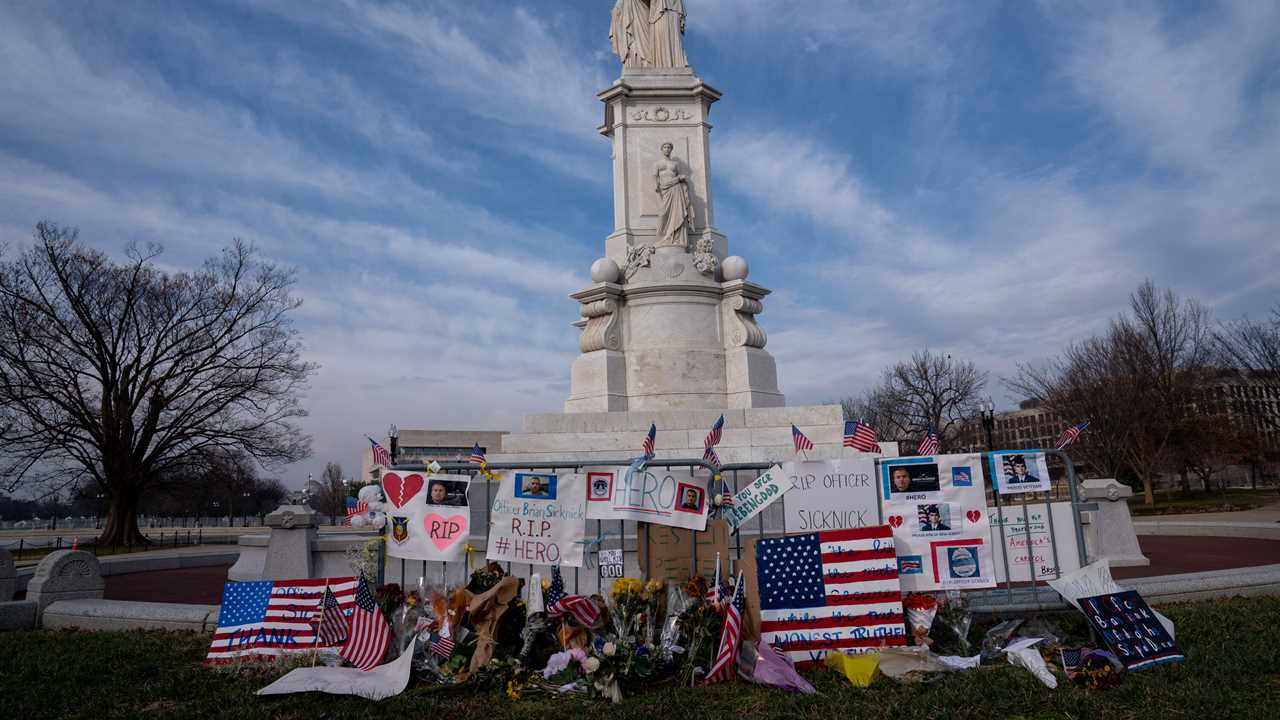
As the House select committee investigating Jan. 6 expands its inquiry, a year after a mob of Trump supporters stormed the Capitol, the death toll from the assault is being disputed.
At least seven people, including three law enforcement officers, lost their lives in connection with the attack, according to a bipartisan Senate report released in June. About 150 officers from the Capitol Police, the Metropolitan Police Department and local agencies were injured, and hundreds of workers were traumatized by the mob. But the total number of fatalities stemming from the assault has been contested amid a political battle over responsibility for the worst attack on the Capitol in centuries.
Republican lawmakers and conservative commentators, aiming to downplay or deny the scope of the violence on Jan. 6, have sought to rewrite history by reducing the death toll or inaccurately portraying the victims.
“It was Trump supporters who lost their lives that day,” Representative Jody B. Hice, Republican of Georgia, said at a House hearing in May. “Not Trump supporters who were taking the lives of others.”
A host on the right-wing television network Newsmax falsely claimed a month after the riot that only one person had died.
Understand the Jan. 6 Investigation
Both the Justice Department and a House select committee are investigating the events of the Capitol riot. Here's where they stand:
- Inside the House Inquiry: From a nondescript office building, the panel has been quietly ramping up its sprawling and elaborate investigation.
- Criminal Referrals, Explained: Can the House inquiry end in criminal charges? These are some of the issues confronting the committee.
- A Big Question Remains: Will the Justice Department move beyond charging the rioters themselves?
- Garland’s Remarks: Facing pressure from Democrats, Attorney General Merrick Garland vowed that the D.O.J. would pursue its inquiry into the riot “at any level.”
In its final report, the House committee could weigh in on an official death toll from the mob violence. Public hearings planned for the coming months could also examine more closely the circumstances in which each person died and the culpability of the mob in those deaths.
The seven people cited in the Senate report include four Trump supporters. Ashli Babbitt, an Air Force veteran, was fatally shot by a Capitol Police officer as rioters tried to breach the House chamber. Kevin D. Greeson died of a heart attack, collapsing on the sidewalk west of the Capitol on Jan. 6. Rosanne Boyland appeared to have been crushed in a stampede of fellow rioters as they surged against the police. And Benjamin Philips, the founder of a pro-Trump website called Trumparoo, died of a stroke.
Mr. Greeson and Mr. Philips died of natural causes, the Washington medical examiner said in April. He added that Ms. Boyland’s death was caused by an accidental overdose.
The three law enforcement officials included in the Senate report’s death toll are Officer Brian D. Sicknick of the Capitol Police, who was attacked by the mob and died on Jan. 7; Officer Jeffrey Smith of the Metropolitan Police Department, who killed himself after the attack; and Officer Howard S. Liebengood of the Capitol Police, who also died by suicide four days afterward.
The Capitol Police had previously said that Mr. Sicknick died from injuries sustained “while physically engaging with protesters.” The Washington medical examiner later ruled that he had died of natural causes: multiple strokes that occurred hours after Mr. Sicknick’s confrontation with the mob. The medical examiner added, however, that “all that transpired played a role in his condition.”
Key Figures in the Jan. 6 Inquiry
The House investigation. A select committee is scrutinizing the causes of the Jan. 6 riot at the U.S. Capitol, which occurred as Congress met to formalize Joe Biden’s election victory amid various efforts to overturn the results. Here are some people being examined by the panel:
Two other Metropolitan Police officers — Gunther Hashida and Kyle DeFreytag — also died by suicide in July, six months after the riot and a month after the Senate report was released. The police agencies have not classified the four suicides as “line of duty” deaths that would provide the victims’ families with enhanced benefits. Washington law excludes suicide deaths from the line-of-duty designation.
Democratic lawmakers have sought to include the police suicides as deaths that occurred in connection with Jan. 6. Representative Alexandria Ocasio-Cortez, Democrat of New York, said on Twitter in October that the Capitol riot was “a terror attack” that left “almost 10 dead,” a toll that apparently included the four suicides.
Other Democratic members of Congress have lobbied for the police suicides to be designated as line-of-duty deaths. Senators Mark Warner and Tim Kaine, and Representatives Jennifer Wexton and Donald S. Beyer Jr., all Democrats of Virginia, wrote to Mayor Muriel E. Bowser of Washington in October asking that Officer Smith be granted a line-of-duty death designation.
“Officer Jeffrey Smith was a mentally healthy person who received a blow to the head, began to exhibit symptoms he had never exhibited before, and nine days later died by suicide,” the lawmakers’ letter said. “The explanation for this tragedy seems clear.”






